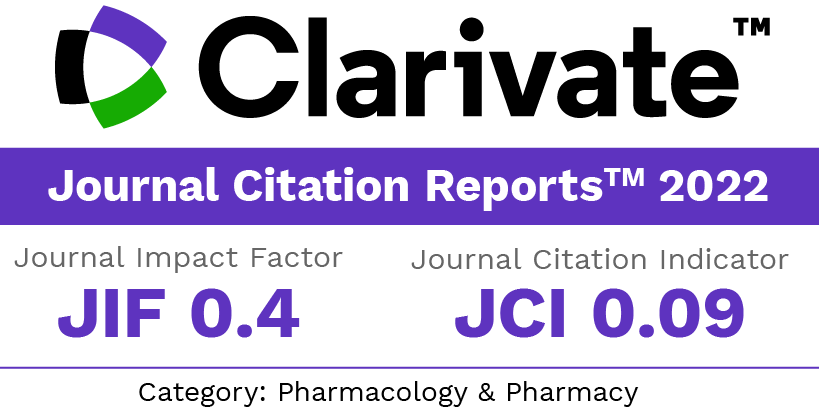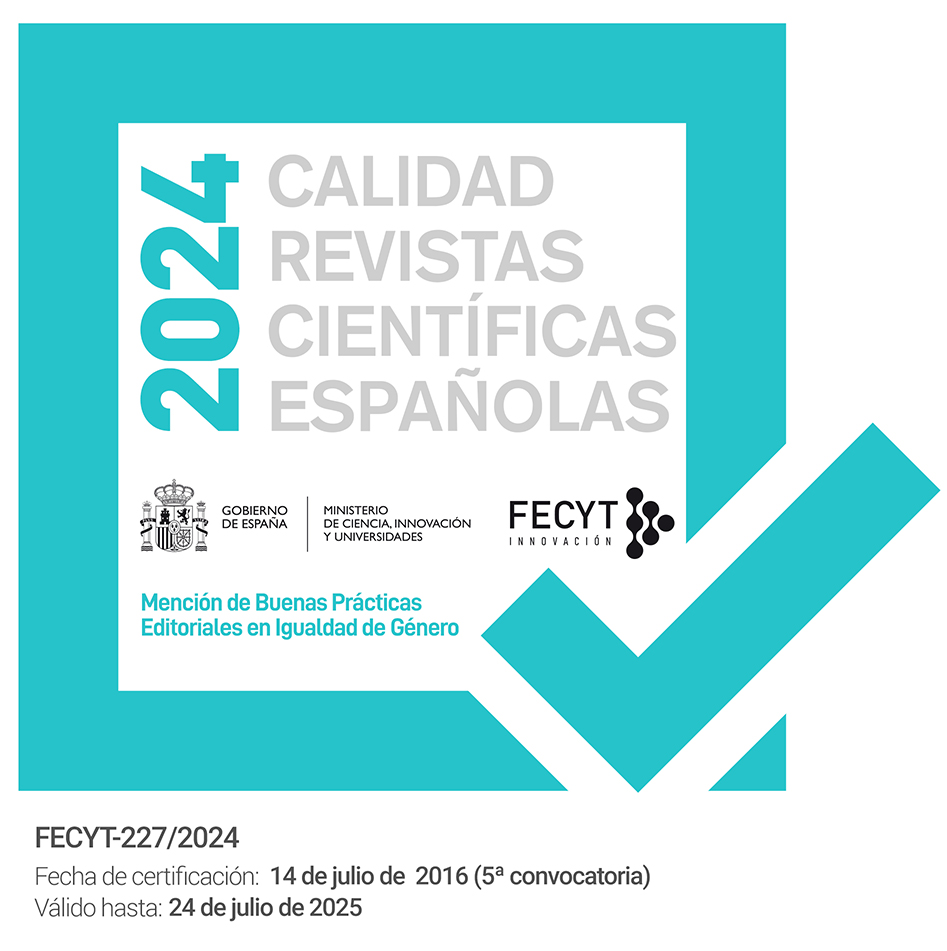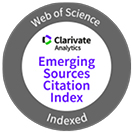Bibliometric study of the scientific production published by Ars Pharmaceutica in the period 2001-2013.
Keywords:
Access to Information, Bibliometrics, Bibliometric Indicators, Journal Article, Medical Subject Headings.Abstract
Aim: To analyze the scientific activity and the production of information of the Ars Pharmaceutica journal as the Spanish scientific publication of reference in the pharmaceutical area.
Materials and Methods: Transversal descriptive study of the results obtained from the bibliometric analysis of the articles published in the journal. Data was obtained from direct queries and Internet access to the scientific literature contained in the electronic version of the journal during the 2001-2013 period.
Results: During the period studied 623 articles were published. The number of original articles was 387 (62.12%) with a productivity index of 2.59. The number of institutions identified with published articles was 173. The predominant language was Spanish with 396 (63.56%) articles. We counted 1925 keywords, of which 441 (22.91%) coincided with Medical Subject Headings (MeSH). The median calculation of the obsolescence of quoted references was 7, and the Price Index was 34.37%. The percentage of self-citations was 1.80%. Impact data showed a moderate increase.
Conclusions: An appropriate proportion of original articles were found and an adequate percentage of satisfactory citable articles. The low percentage of keywords that coincide with Medical Subject Headings is noteworthy. The bibliographical references found in the articles come mainly from the English-speaking area and from journals indexed in the Journal Citation Report. The obsolescence analysis of these references produced suitable.
Downloads
References
Sanz-Valero J, Gil A, Wanden-Berghe C, Martínez de Victoria E. Análisis bibliométrico y temático de la producción científica sobre ácidos grasos omega-3 indizada en las bases de datos internacionales sobre ciencias de la salud. Nutr Hosp. 2012;27(Supl 2):S41–8.
Tomás-Castera V, Sanz-Valero J, Wanden-Berghe C. Estudio bibliométrico de la producción científica de la Revista de Nutrição a través de la Red SciELO (2001 a 2007). Rev Nutr. 2010;23(5):791–9.
Sanz-Valero J, Tomás-Casterá V, Tomás-Gorriz V. Estudio bibliométrico de producción y consumo de la revista Farmacia Hospitalaria (2004-2012). Farm Hosp. 2014;38(1):1–8.
Ferriols R, Santos B, Artacho S, Clopés A, Guerrero MD, Martínez MJ, et al. A bibliometric analysis of the Farmacia Hospitalaria journal (2001-2006). Farm Hosp. 2007;31(3):141–9.
Brown P, Lutzker A, Cabell D, Marincola E, Chakravarti A, Roberts R, et al. Declaración de Bethesda sobre Publicación de Acceso Abierto [Monografía en Internet]. Bethesda, USA: Howard Hughes Medical Institute; 2003 [consultada 30 Mar 2014]. Disponible en: http://ictlogy.net/articles/bethesda_es.html
Aleixandre Benavent R, Valderrama Zurián JC, Castellano Gómez M, Simó Meléndez R, Navarro Molina C. Factor de impacto de las revistas médicas españolas. Med Clínica. 2004;123(18):697–701.
Sanz-Valero J, Tomás Casterá V, Wanden-Berghe C. Estudio bibliométrico de la producción científica publicada por la Revista Panamericana de Salud Pública en el período de 1997 a 2012. Rev Panam Salud Pública. 2014;35(2):81–8.
Meneghini R. Visibilidade internacional da produção brasileira em saúde coletiva. Cad Saúde Pública. 2010;26(6):1058–9.
Corera-Álvarez E, González-Molina A, López-Illescas C, Vargas-Quesada B. Indicadores bibliométricos de la actividad científica española 2010 [Monografía en Internet]. Chinchilla-Rodríguez Z, editor. Fundación Española para la Ciencia y la Tecnología (FECYT); 2013 [consultada 31 Mar 2014]. Disponible en: http://icono.fecyt.es/informesypublicaciones/Documents/indicadores%20bibliometricos_web.pdf
Camargo Jr KR de, Coeli CM. Múltiple autoría: crecimiento o burbuja expandida. Rev Saúde Pública. 2012;46(5):894–900.
Tomás-Casterá V, Sanz-Valero J, Juan-Quilis V. Estudio bibliométrico de la producción científica y de consumo de las revistas sobre nutrición indizadas en la red SciELO. Nutr Hosp. 2013;28(3):969–70.
Fundación Española de Ciencia y Tecnología (FECYT). Mujer y Ciencia: La situación de las mujeres investigadoras en el sistema español de ciencia y tecnología [Monografía en Internet]. Madrid, España: FECYT; 2007 [consultada 31 Mar 2014]. Disponible en: http://www.fecyt.es/fecyt/docs/tmp/1649797961.pdf
Archambault E, Vignola-Gagne E, Cote G, Lariviere V, Gingras Y. Benchmarking scientific output in the social sciences and humanities: The limits of existing databases. Scientometrics. 2006;68(3):329–42.
Cremades Pallas R, Burbano P, Valcárcel de la Iglesia M, Burillo-Putze G, Martín-Sánchez F, Miró O. Impacto de la inclusión de artículos escritos en inglés en revistas biomédicas españolas de edición multilingüe. An Sist Sanit Navar. 2013;36(3):467–70.
Guardiola-Wanden-Berghe R, Sanz-Valero J, Wanden-Berghe C. Medical subject headings versus American Psychological Association Index Terms: indexing eating disorders. Scientometrics. 2013;94(1):305–11.
Jenuwine ES, Floyd JA. Comparison of Medical Subject Headings and text-word searches in MEDLINE to retrieve studies on sleep in healthy individuals. J Med Libr Assoc JMLA. 2004;92(3):349–53.
Chang AA, Heskett KM, Davidson TM. Searching the literature using medical subject headings versus text word with PubMed. Laryngoscope. 2006;116(2):336–40.
De Granda Orive JI, García Río F, Roig Vázquez F, Escobar Sacristán J, Gutiérrez Jiménez T, Callol Sánchez L. Las Palabras Clave como herramientas imprescindibles en las búsquedas bibliográficas: análisis de las áreas del sistema respiratorio a través de Arch Bronconeumol. Arch Bronconeumol. 2005;41(2):78–83.
De Granda Orive JI. Las siglas: ¿debemos aceptarlas? Arch Bronconeumol. 2003;39(6):287.
Cheng TO. Medical abbreviations. J R Soc Med. 2004;97(11):556.
Das-Purkayastha P, McLeod K, Canter R. Specialist medical abbreviations as a foreign language. J R Soc Med. 2004;97(9):456.
Cheng TO. Plea to let each acronym be spelled out every time (PLEASE). Eur Heart J. 1995;16(2):292.
Brown T. Journal quality metrics: options to consider other than impact factors. Am J Occup Ther Off Publ Am Occup Ther Assoc. 2011;65(3):346–50.
Tomás-Castera V, Sanz Valero J, Juan-Quilis V, Wanden-Berghe C, Culebras J, García de Lorenzo y Mateos A. Estudio bibliométrico de la revista Nutrición Hospitalaria en el periodo 2001 a 2005: parte II, análisis de consumo; las referencias bibliográficas. Nutr Hosp. 2008;23(6):541–6.
Campanario J, Candelario A. La influencia de las autocitas en el aumento del factor de impacto en revistas de ciencias sociales. Rev Esp Doc Cient. 2010;33(2):185–200.
Callaham M, Wears RL, Weber E. Journal prestige, publication bias, and other characteristics associated with citation of published studies in peer-reviewed journals. JAMA J Am Med Assoc. 2002;287(21):2847–50.
Theander SS, Wetterberg L. Schizophrenia in Medline 1950-2006: a bibliometric investigation. Schizophr Res. 2010;118(1-3):279–84.
Lemu R, Koricheva J. Does scientific collaboration increase the impact of ecological articles? Bioscience. 2005;55(5):438–43.
Hart R. Collaboration and article quality in the literature of academic librarianship. J Acad Librariansh. 2007;33(2):190–5.
Phelan T. A compendium of issues for citation analysis. 30. Scientometrics. 1999;45(1):117–36.
Downloads
Published
How to Cite
Issue
Section
License
The articles, which are published in this journal, are subject to the following terms in relation to the rights of patrimonial or exploitation:
- The authors will keep their copyright and guarantee to the journal the right of first publication of their work, which will be distributed with a Creative Commons BY-NC-SA 4.0 license that allows third parties to reuse the work whenever its author, quote the original source and do not make commercial use of it.
b. The authors may adopt other non-exclusive licensing agreements for the distribution of the published version of the work (e.g., deposit it in an institutional telematic file or publish it in a monographic volume) provided that the original source of its publication is indicated.
c. Authors are allowed and advised to disseminate their work through the Internet (e.g. in institutional repositories or on their website) before and during the submission process, which can produce interesting exchanges and increase citations of the published work. (See The effect of open access).


















